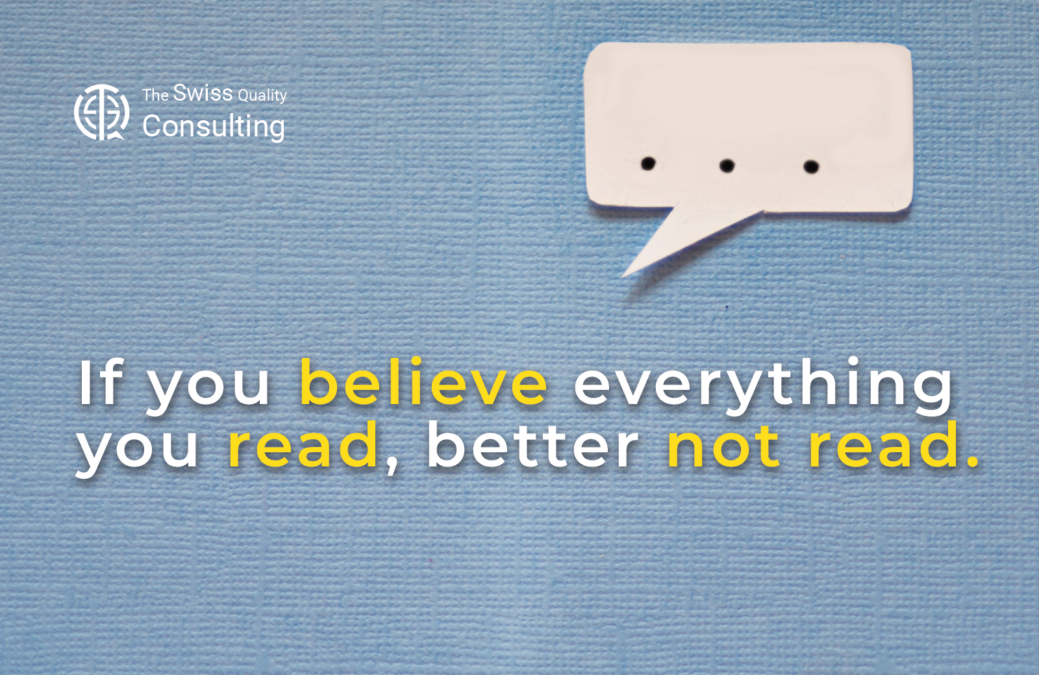The Importance of Critical Thinking in a World of Information Overload
“If you believe everything you read, better not read.” This sage advice underscores the critical importance of developing a discerning mind in today’s age of information overload. In a digital world saturated with news, opinions, and content, it’s essential to exercise discernment, skepticism, and critical thinking to navigate the vast sea of information responsibly.
1. The Digital Deluge:
The advent of the internet has democratized information access like never before. While this is undoubtedly a positive development, it has also given rise to an overwhelming deluge of information. News articles, social media posts, blogs, and videos compete for our attention, often with varying degrees of accuracy and credibility. In such a landscape, blindly accepting everything we read can lead to misinformation, confusion, and misguided beliefs.
2. The Proliferation of Misinformation:
Misinformation, whether deliberate or unintentional, is rampant in the digital age. False narratives and misleading content can easily spread, sometimes at alarming rates. Believing and sharing such information without question can have real-world consequences, from sowing discord to causing harm. It’s crucial to approach online content with a healthy dose of skepticism and a commitment to fact-checking.
3. Confirmation Bias:
Human beings are prone to confirmation bias, the tendency to seek out and interpret information in a way that confirms our preexisting beliefs. This bias can lead us to selectively accept information that aligns with our views while dismissing or ignoring contrary evidence. To combat confirmation bias, we must actively challenge our assumptions and be open to alternative perspectives.
4. The Need for Critical Thinking:
Critical thinking is a valuable skill that empowers individuals to assess information critically, discern fact from fiction, and make informed decisions. It involves asking questions, evaluating evidence, and considering the credibility of sources. Critical thinkers do not accept claims at face value; instead, they engage in thoughtful analysis and seek reliable information.
5. Media Literacy:
Media literacy is an essential component of critical thinking in the digital age. It encompasses the ability to analyze, evaluate, and interpret media messages. Being media literate means recognizing potential biases, understanding the persuasive techniques used in media content, and discerning between reliable and unreliable sources.
6. Responsible Information Consumption:
To avoid falling victim to misinformation, it’s vital to practice responsible information consumption. This includes fact-checking before sharing information, cross-referencing multiple sources, and being mindful of the credibility of the platforms and authors. Taking these steps helps ensure that the information we encounter and share is accurate and reliable.
7. Encouraging Healthy Skepticism:
Healthy skepticism is not about cynicism or distrust but about maintaining a balanced and critical perspective. It encourages us to question and verify information, fostering a more informed and resilient society. By being skeptical in a constructive way, we contribute to a culture of accountability and accuracy.
8. The Role of Education:
Education plays a pivotal role in fostering critical thinking skills. Schools and educational institutions should prioritize teaching students how to think critically, evaluate sources, and navigate the digital landscape responsibly. These skills are invaluable not only in academic pursuits but also in everyday life.
The quote, “If you believe everything you read, better not read,” serves as a powerful reminder of the importance of critical thinking in an age where information is abundant but not always reliable. Developing the ability to question, evaluate, and discern information is essential for making informed decisions, fostering a more responsible digital society, and safeguarding against the pitfalls of misinformation.
#CriticalThinking #MediaLiteracy #InformationOverload #Skepticism #FactChecking























